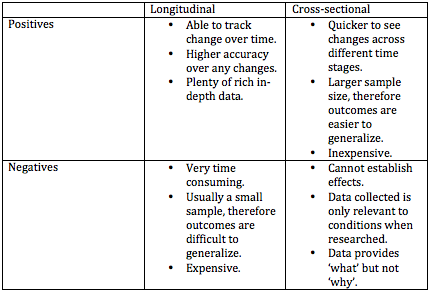Suppose there’s a new theory that explains how individuals in different age groups interact through social media -Facebook, Twitter, or Myspace (thanks for the message, Tom!) and you want to test if this theory is correct. You would have two options:
1. Carry out a cross-sectional study (the short way)
2. Carry out a longitudinal study (the long way)
You would probable make this decision dependant on a number of factors such as how much time you (the researcher) what resources are available (funding, research materials, relevant equipment etc.). Each of the two methods of course have their pros and cons, as is the dilemma many researchers face with opposing research methods. Let’s firstly run through these and then we can run scenarios depending on which method to go with.

Now that I’ve briefly touched on the pros and cons of each method, let’s run through the scenarios.
“I have time to spare”
Okay! A longitudinal approach would be ideal for this situation. Longitudinal studies are observational and require the researcher to observe an interest (social media use in this instance) multiple times over a long period of time. To test out this theory (bearing in mind that it is hypothetical), you want to gather a group of individuals who are the same age (16, for example) – this will erase any age bias as having individuals of different ages could invalidate the study. You will need to establish a time frame to carry out this research – 3 months, 6 months, 12 months or maybe longer. As this theory is concerned with age, carrying out a study over 2-4 years may be well suited, this way you are able to observe the individuals as they grow and whether there is a change in their social media use, but for some individuals and organisations, 4 years is a long time.
As you would be gathering data over a very long period of time, the data you gather will be very rich and in-depth and therefore yielding plenty of information regarding usage of social media over time. In addition to providing any trends in changing use of social media, the rich information gathered would also provide reasons as to why a certain behaviour has occurred, and therefore inferring cause and effect.
"I'm on a tight schedule"
If you want to get a 'rough' idea of how social media use differs across age groups, a cross-sectional study would be more suited as it’s quicker and less expensive! As with longitudinal studies, cross-sectional studies are also observational but don’t require the researcher to observe over a long period of time. Although these are two big positives, the data that is produced won’t be as rich as that of a longitudinal study. However, cross-sectional studies can be used as pilot studies in order to gain insight, this could be used as a foundation for a longitudinal study to look more in-depth into the behaviour.
"But wait... why not both?"
Actually, that’s an option you can go for. Cross-sequential studies combine both cross-sectional and longitudinal methods; this shortens the length of the research and reduces the chances of developmental assumptions. By using this method, you are able to track multiple groups over a time frame and observe any changes across groups and within groups. But only if you have time, as this requires the length of a longitudinal study!
"How do I decide?"
Ultimately, the most important aspect to take into consideration when debating whether to opt for a longitudinal, cross-sectional, or cross-sequential study is the length of your time frame (and most likely, the budget available). It is also dependent on what you’re researching – for example, if there isn’t much research on the topic (such as this hypothetical theory) it may be a good idea to carry out a cross-sectional study to begin with. This will generate initial data and show some insight into the topic, which will provide foundations for further research. Through this, you would use a cross-sectional study as your pilot study and then be able to decide on what your next steps should be – this will save you time and money and will give you an idea as to whether there is something worth researching for a prolonged period of time.

